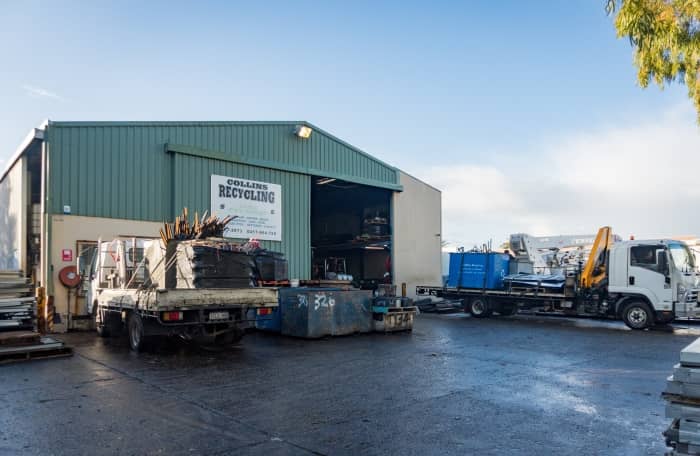In past centuries, metal recycling had strong ties to resource availability and economic rewards. While these are still significant factors, the importance of scrap metal recycling is more focused on the environmental impact of metal (and all other) recycling.
What are the Environmental Benefits of Scrap Metal Recycling?
There are several reasons scrap metal recycling is so important to our environment. These include:
1. Reducing the Amount of Waste Going into Landfills
Many of us do not spend much time thinking about how much waste we produce. The average Australian creates 500 kg of waste every year. A significant amount of this will end up in landfills.
Once in a landfill, the metal waste breaks down, and toxic chemicals (such as lead, mercury and cadmium) are released into the environment. Additionally, landfills are a significant source of methane (a greenhouse gas) that substantially contributes to the global climate crisis.
When metal refuses to be incinerated, the burning chemicals and runoff from landfills cause excessive harm to workers who handle the recycling. Those without correct protective equipment are exposed to high levels of toxic chemicals. Communities surrounding landfills often find toxic leakage in their water supplies.
2. Save Natural Resources
Metals are highly recyclable and reusable resources. When metal is recycled, it saves natural resources by reducing the need to extract and process raw materials. Recycling scrap metal also uses less energy than raw materials. For example, one ton of recycled steel conserves 55 kilos of limestone, 635 kilos of coal, and 1,134 kilos of iron ore.
This means fewer greenhouse gas emissions. According to estimates, recycling steel and tin can take about 60 per cent of the power necessary to create them from raw materials.
3. Help to Reduce Greenhouse Gasses
Metals decomposing in landfill produce methane, a greenhouse gas more destructive to the environment than carbon dioxide. Additionally, greenhouse gases are a byproduct of extracting and processing raw materials. Using recycled metals effectively reduces the need for this extraction and processing.
What are the Economic Benefits of Scrap Metal Recycling?
In addition to positive environmental impacts, recycling scrap metal has economic benefits available to businesses and the public
- Job Creation – A significant number of jobs are necessary to keep the scrap metal recycling industry functioning. Aside from the companies specialising in reclaiming metal, trucking, shipping, processing, manufacturing, and energy sectors, all play a part in the chain that moves a piece of scrap metal through the recycling process. According to a 2021 report from the Institute of Scrap Recycling Industry, 159,640 jobs were directly supported by recycling operations.
- Enhance Local and Global Economic Expansion – The current supply cannot meet the demand for scrap metal. Expanding recycling and processing centres and exporting reclaimed metals is a growing opportunity to help nations build their economies.
- Individual Profits – Do not make the mistake of thinking that only large corporations benefit financially from recycling scrap metal. Individuals who collect and sort discarded metals will get the going rate per kilo from a recycling centre like Collins Recycling.
What Must Happen to Create a Sustainable Environment?
One of the most vital actions on the part of governments, businesses, and individuals is to make the recycling of scrap metal (and other materials) a priority. Acting with half-hearted efforts will not create the changes necessary to increase sustainability. Scrap metal recycling must be viewed as a critical part of the effort to save the environment that it is and not just a good idea.
- Statutes that make recycling more profitable than waste and a united front from world governments would set a foundation of leading by example for individuals to follow.
- Impactful education that shows what happens if humans fail to recycle and create a sustainable world.
- Simplifying the collection of recyclables to encourage businesses and individuals to participate in regular recycling.
What Impact Will Scrap Metal Recycling Have on Future Generations and the Environment?
Think of our planet as being at a crossroads where choices of today are the key to the world future generations inherit.
If we choose to ignore the warnings from scientists and continue tossing metal into landfills and extracting raw materials to meet our needs, the future looks bleak. Excessive pollution leading to land unfit for crops and a lack of natural resources will lead to scarcity and impoverishment on an unheard-of scope.
If we make conscious choices regarding recycling scrap metals and other recyclable materials, we still have a chance to preserve the planet and its species.
The importance of scrap metal recycling will continue to grow for decades to come. The planet’s resources are limited, and landfills are running out of room. If you want to recycle metal, but are not sure how to separate it or how to transport it, reach out to us at Collins Recycling. Our experienced team can give you advice or arrange a pick-up of your recyclable metals.








